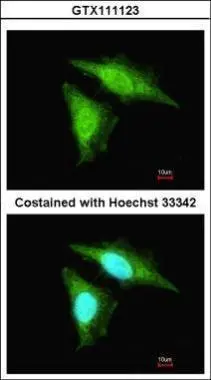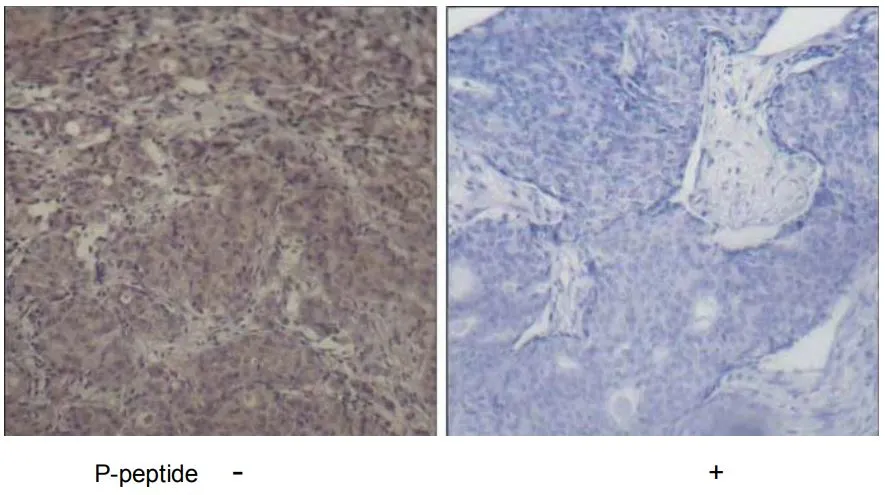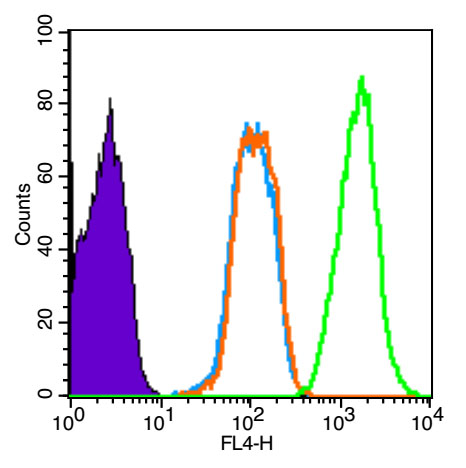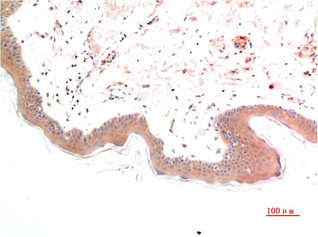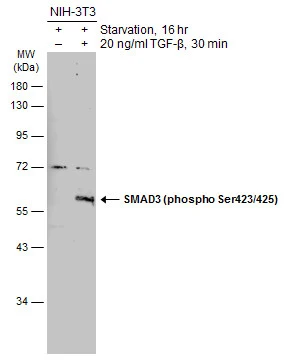
Untreated (–) and treated (+) NIH-3T3 whole cell extracts (30 μg) were separated by 10% SDS-PAGE, and the membrane was blotted with SMAD3 (phospho Ser423/425) antibody (GTX129841) diluted at 1:500. The HRP-conjugated anti-rabbit IgG antibody (GTX213110-01) was used to detect the primary antibody.
SMAD3 (phospho Ser423/425) antibody
GTX129841
ApplicationsWestern Blot
Product group Antibodies
ReactivityHuman, Mouse
TargetSMAD3
Overview
- SupplierGeneTex
- Product NameSMAD3 (phospho Ser423/425) antibody
- Delivery Days Customer9
- Application Supplier NoteWB: 1:500-1:3000. *Optimal dilutions/concentrations should be determined by the researcher.Not tested in other applications.
- ApplicationsWestern Blot
- CertificationResearch Use Only
- ClonalityPolyclonal
- Concentration1 mg/ml
- ConjugateUnconjugated
- Gene ID4088
- Target nameSMAD3
- Target descriptionSMAD family member 3
- Target synonymsHSPC193, HsT17436, JV15-2, LDS1C, LDS3, MADH3, hMAD-3, hSMAD3, mad3, mothers against decapentaplegic homolog 3, MAD homolog 3, MAD, mothers against decapentaplegic homolog 3, SMA- and MAD-related protein 3, SMAD, mothers against DPP homolog 3, mad homolog JV15-2, mad protein homolog, mothers against DPP homolog 3
- HostRabbit
- IsotypeIgG
- Protein IDP84022
- Protein NameMothers against decapentaplegic homolog 3
- Scientific DescriptionThe protein encoded by this gene belongs to the SMAD, a family of proteins similar to the gene products of the Drosophila gene mothers against decapentaplegic (Mad) and the C. elegans gene Sma. SMAD proteins are signal transducers and transcriptional modulators that mediate multiple signaling pathways. This protein functions as a transcriptional modulator activated by transforming growth factor-beta and is thought to play a role in the regulation of carcinogenesis. [provided by RefSeq]
- ReactivityHuman, Mouse
- Storage Instruction-20°C or -80°C,2°C to 8°C
- UNSPSC12352203
References
- Huang C, Lu HF, Chen YH, et al. Curcumin, demethoxycurcumin, and bisdemethoxycurcumin induced caspase-dependent and -independent apoptosis via Smad or Akt signaling pathways in HOS cells. BMC Complement Med Ther. 2020,20(1):68. doi: 10.1186/s12906-020-2857-1Read this paper
- Hsieh WY, Chang TH, Chang HF, et al. Renal chymase-dependent pathway for angiotensin II formation mediated acute kidney injury in a mouse model of aristolochic acid I-induced acute nephropathy. PLoS One. 2019,14(1):e0210656. doi: 10.1371/journal.pone.0210656Read this paper

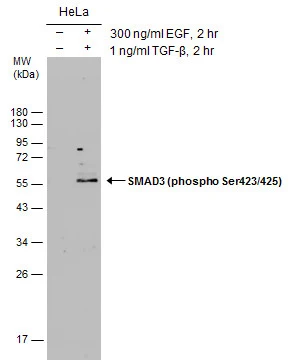

![Untreated (–) and treated (+) A549 whole cell extracts (30 μg) were separated by 10% SDS-PAGE, and the membrane was blotted with SMAD3 (phospho Ser423/Ser425) antibody [GT1207] (GTX00969) diluted at 1:500. The HRP-conjugated anti-rabbit IgG antibody (GTX213110-01) was used to detect the primary antibody.](https://www.genetex.com/upload/website/prouct_img/normal/GTX00969/GTX00969_4000000170_20200313_WB_treatment_TGF-beta1_w_23053121_737.webp)
